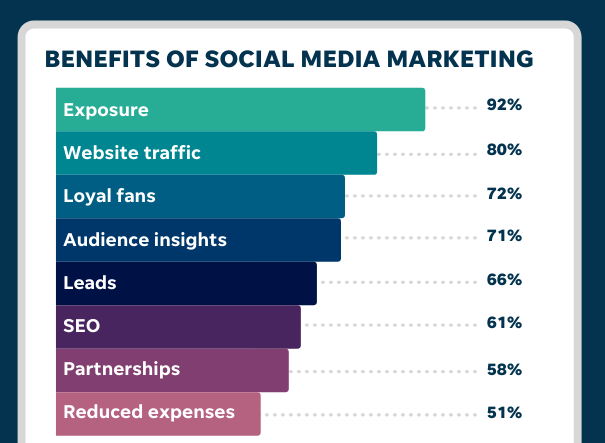
Transform Your Business with Social Media Marketing:
Strategies for Success

SOCIAL MEDIA MARKETING
Social media marketing refers to using social media platforms to connect with your audience to build your brand, increase sales, and drive website traffic. It involves creating and sharing content on social media networks, engaging with followers, and utilizing paid advertising options. Key components include content creation, audience engagement, community building, paid advertising, and analytics. Social media marketing is essential for businesses to increase brand awareness, foster customer relationships, and achieve marketing objectives in today’s digital landscape.
Benefits of Social Media Marketing (SMM)
Increased Brand Awareness: Social media marketing (SMM) significantly boosts brand visibility by leveraging various platforms to reach a broad audience. Consistent content sharing and active engagement help in spreading brand awareness among potential customers.
Improved Customer Engagement: SMM facilitates direct communication between businesses and their customers, fostering meaningful interactions. Engaging with followers through comments, messages, and posts enhances customer loyalty and builds lasting relationships.
Cost-Effective Marketing: Compared to traditional advertising methods, SMM is often more cost-effective. Many social media platforms offer free tools for content creation and sharing, while paid advertising options allow for precise targeting without exorbitant costs.
Targeted Advertising: Leveraging user data, social media platforms enable businesses to target their advertising efforts accurately. Advertisers can specify demographics, interests, and behaviors to ensure ads reach the most relevant audience, increasing conversion rates.
Increased Website Traffic: Sharing website links on social media channels drives direct traffic to the site. Regular sharing of valuable content and promotions attracts visitors, enhancing opportunities for conversions and sales.
Enhanced SEO Rankings: Social media signals play a vital role in influencing search engine rankings. Active engagement and content sharing contribute to improved visibility and rankings in search engine results.
Marketplace Insights: Social media platforms provide valuable insights into customer behavior, preferences, and trends. Monitoring metrics such as comments, likes, and shares helps businesses gain actionable insights to inform their marketing strategies.
Crisis Management: Social media enables businesses to respond promptly to customer inquiries, concerns, or crises. Transparent communication helps mitigate negative feedback, address issues, and uphold a positive brand reputation.
Competitive Advantage: SMM allows businesses to stay competitive by keeping abreast of industry trends and monitoring competitors. Maintaining an active presence on social media helps differentiate businesses and position them as industry leaders.
Global Reach: Social media platforms offer global reach, allowing businesses to connect with customers worldwide. Whether targeting local or international audiences, SMM provides opportunities to expand reach and grow the customer base globally.
Creating your social media marketing plan
Set Goals: Begin by establishing clear objectives for your social media endeavors. Whether it’s enhancing brand recognition, driving web traffic, or generating leads, having well-defined goals will serve as the cornerstone of your strategy.
Know Your Audience: Gain a thorough understanding of your target demographic – their demographics, interests, preferences, and behaviors. This insight will enable you to tailor your content and messaging to effectively resonate with your audience.
Choose Platforms: Identify the social media platforms that are most pertinent to your target audience and industry. Focus your efforts on platforms where your audience is most active to maximize engagement and reach.
Content Plan: Develop a comprehensive content strategy that aligns with your established goals and appeals to your audience. Determine the types of content you’ll share, such as articles, videos, infographics, or user-generated content, and establish a consistent posting schedule to maintain audience engagement.
Engage: Cultivate meaningful interactions with your audience by promptly responding to comments, messages, and mentions. Encourage engagement by posing questions, conducting polls, and hosting interactive sessions to foster a sense of community and loyalty among your followers.
Analyze Performance: Regularly assess your social media performance using analytics tools provided by each platform. Monitor key metrics such as engagement rates, reach, click-through rates, and conversions to evaluate the effectiveness of your strategies and make informed decisions for optimization.
By adhering to these steps and continuously refining your approach based on insights and feedback, you can develop a robust social media marketing plan that drives tangible results and aids in accomplishing your business objectives.
Mastering Social Media Marketing:
Key Areas of Excellence
By excelling in these four key areas of Social Media Marketing, I can effectively reach and engage your target audience, drive meaningful results, and achieve success in your SMM efforts.
Content Creation
Excelling in content creation involves crafting engaging and shareable content tailored to your target audience's interests and preferences. This includes writing compelling copy, creating eye-catching visuals, and producing multimedia content such as videos or infographics.
Audience Engagement
Being skilled at audience engagement means effectively interacting with your followers, responding to comments and messages, and fostering a sense of community on your social media channels. This involves actively listening to your audience, addressing their needs and concerns, and encouraging meaningful interactions.
Analytics and Insights
Mastery of analytics and insights involves analyzing social media metrics to track performance, identify trends, and make data-driven decisions. This includes measuring engagement, reach, click-through rates, and conversions to optimize your SMM strategies for better results.
Strategy Development
A strong ability to develop SMM strategies involves setting clear objectives, identifying target audiences, selecting appropriate platforms, and outlining content plans to achieve business goals. This includes strategic thinking, planning, and adapting strategies based on insights and feedback.
